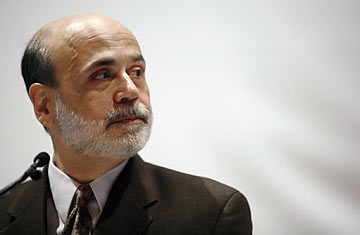
Federal Reserve Chairman Ben Bernanke at the American Economic Association conference in Atlanta
(2 of 2)
So why doesn't he do something about it? Why talk so much about the eventual need to undo his extraordinary money-easing interventions and not at all about additional interventions? The mostly left-leaning doves believe that Bernanke, as bold as he was during the crisis, is now being outrageously cautious. They want him to buy even more mortgages and pump even more liquidity into the economy. They would welcome a little inflation, which could make Americans feel a bit poorer but could also encourage lenders and investors to put more money to work rather than hoarding it. Some of them suspect that Bernanke, a onetime economic adviser to George W. Bush, is choosing the brakes over the gas because he's a conservative Republican at heart.
But unless Bernanke is an unusually good liar, he is a moderate Republican at heart, a market-based Keynesian who has a lot in common with Obama economists such as Larry Summers or Christina Romer, a pragmatist whose defining political experience before the past couple of years was getting screamed at by antitax activists while serving on a local school board. He's also a longtime inflation dove, and since the crisis began he's shown unprecedented willingness to jam the accelerator. It's true that he talks a fair amount about hitting the brakes someday, but he hasn't even tapped them yet.
Still, doves want to know why he isn't providing even more gas. Part of the answer is that he doesn't seem to think that pouring more cash into the banking system would generate many jobs, because liquidity is not the current problem. Banks already have reserves; they just aren't using them to make loans and spur economic activity. Bernanke thinks injecting even more money would be like pushing on a string.
The rest of the answer is that Bernanke believes a Fed chairman needs to act like he's worried about inflation — and actually worry about inflation — even when he doesn't think it's around the corner. Inflation fears may not be justified by data today, but they can be self-fulfilling tomorrow, and the hawks who harbor them are quite influential on Wall Street. If markets and Chinese bondholders start to lose confidence in the value of the U.S. dollar, that could trigger another panic, regardless of the rationality of their fears. A little inflation might be a good thing, but if jittery markets take a little inflation as a sign that the Fed has gone soft, the result could be a run on the dollar and out-of-control inflation. Bernanke is determined not to squander the Fed's hard-won credibility as an inflation fighter, so he's continuing to talk like one, even though he hasn't really started the fight.
To Bernanke, the benefits of additional monetary stimulus would be modest at best, while the costs could be disastrous. Reasonable economists can and do disagree. The fact that doves think he's obsessed with inflation and unconcerned with jobs while hawks think the opposite is not proof that he has found appropriate middle ground. And he shouldn't be confirmed just because markets are freaking out that he might not be. But Fed chairmen are supposed to be apolitical, analytical and data-driven; Bernanke is all those things, and he did, after all, save the world. If Republicans don't want to give Obama a victory, they should think of Bernanke as one of Bush's best appointees. And if Democrats want to distance themselves from Wall Street, they should pass tough financial reforms so that Chairman Bernanke never has to save the world again.
